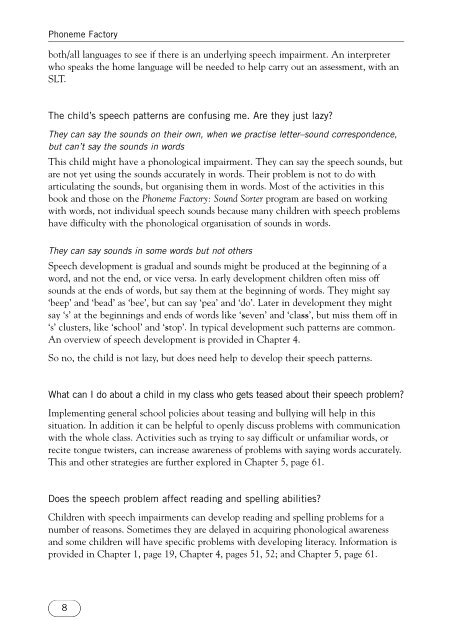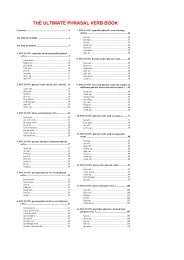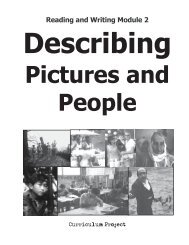Developing Speech and Language Skills - Noel's ESL eBook Library
Developing Speech and Language Skills - Noel's ESL eBook Library
Developing Speech and Language Skills - Noel's ESL eBook Library
You also want an ePaper? Increase the reach of your titles
YUMPU automatically turns print PDFs into web optimized ePapers that Google loves.
Phoneme Factoryboth/all languages to see if there is an underlying speech impairment. An interpreterwho speaks the home language will be needed to help carry out an assessment, with anSLT.The child’s speech patterns are confusing me. Are they just lazy?They can say the sounds on their own, when we practise letter–sound correspondence,but can’t say the sounds in wordsThis child might have a phonological impairment. They can say the speech sounds, butare not yet using the sounds accurately in words. Their problem is not to do witharticulating the sounds, but organising them in words. Most of the activities in thisbook <strong>and</strong> those on the Phoneme Factory: Sound Sorter program are based on workingwith words, not individual speech sounds because many children with speech problemshave difficulty with the phonological organisation of sounds in words.They can say sounds in some words but not others<strong>Speech</strong> development is gradual <strong>and</strong> sounds might be produced at the beginning of aword, <strong>and</strong> not the end, or vice versa. In early development children often miss offsounds at the ends of words, but say them at the beginning of words. They might say‘beep’ <strong>and</strong> ‘bead’ as ‘bee’, but can say ‘pea’ <strong>and</strong> ‘do’. Later in development they mightsay ‘s’ at the beginnings <strong>and</strong> ends of words like ‘seven’ <strong>and</strong> ‘class’, but miss them off in‘s’ clusters, like ‘school’ <strong>and</strong> ‘stop’. In typical development such patterns are common.An overview of speech development is provided in Chapter 4.So no, the child is not lazy, but does need help to develop their speech patterns.What can I do about a child in my class who gets teased about their speech problem?Implementing general school policies about teasing <strong>and</strong> bullying will help in thissituation. In addition it can be helpful to openly discuss problems with communicationwith the whole class. Activities such as trying to say difficult or unfamiliar words, orrecite tongue twisters, can increase awareness of problems with saying words accurately.This <strong>and</strong> other strategies are further explored in Chapter 5, page 61.Does the speech problem affect reading <strong>and</strong> spelling abilities?Children with speech impairments can develop reading <strong>and</strong> spelling problems for anumber of reasons. Sometimes they are delayed in acquiring phonological awareness<strong>and</strong> some children will have specific problems with developing literacy. Information isprovided in Chapter 1, page 19, Chapter 4, pages 51, 52; <strong>and</strong> Chapter 5, page 61.8











